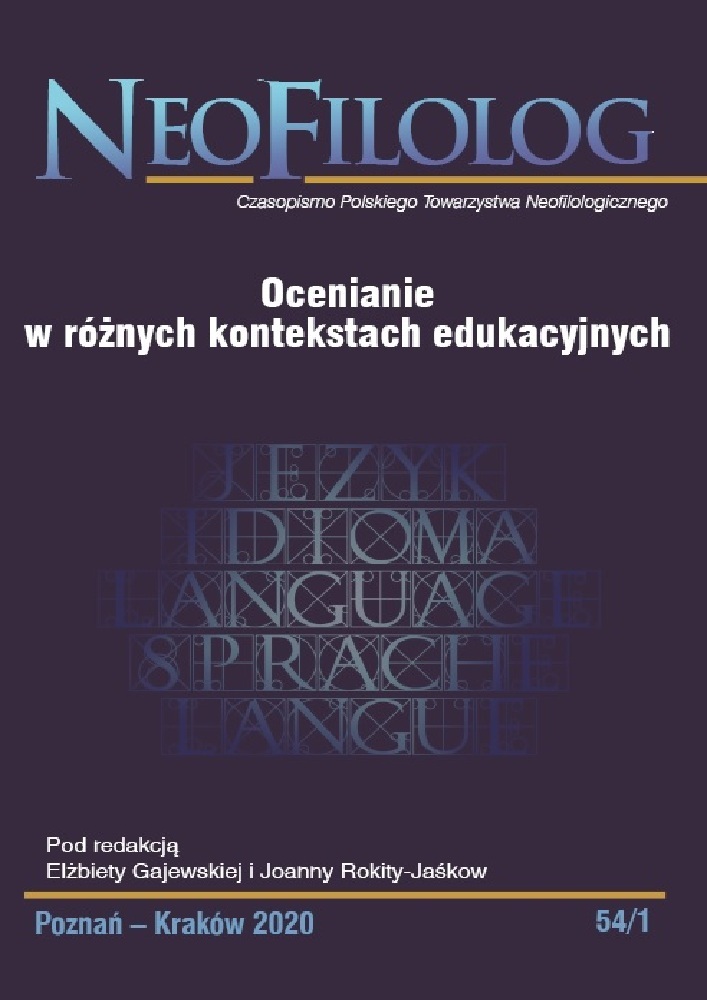Abstrakt
This article illustrates ways of assessing students’ work in the Multimedia master’s seminar and compares the benefits of formative and summative evaluations in this context. During the Multimedia seminar, prospective foreign language teachers and translators create their own multimedia resources, which fill a gap in teaching materials on offer. This allows the students to become specialists in particular areas. This article illustrates ways of assessing students’ work in the Multimedia master’s seminar and compares the benefits of formative and summative evaluations in this context. Students appreciated the importance of formative assessment, recognizing its advantage over summative evaluation. Systematic semi-autonomous work subjected to continual verification proved to be key to the achievement of the desired skills. The results also demonstrated how knowledge of learners’ first and second languages is advantageous, as it allows teachers to more accurately identify and evaluate the difficulties learners face during the acquisition of a third language. These unusual forms of learning by teaching require considerable time and sufficient motivation but notably improve the quality of the learning process.
Bibliografia
Coyle D., Hood P., Marsh D. (2010), C.L.I.L. Content and Language Integrated Learning. Cambridge: CUP.
Debyser F. (1970), La linguistique contrastive et les interférences. „Langue française”, n° 8 (1070), 31–61.
Gabryś-Barker D. (2005), Aspects of multilingual storage, processing and retrieval. Katowice: Wydawnictwo Uniwersytetu Śląskiego.
Martin J-P. (1989), Quand les élèves font la classe. „Le Français dans le monde”, n° 224, 51–55.
Martin J-P. (2004), Lernen durch Lehren : quand les apprenants font la classe. „Les Cahiers de l’APLIUT”, n° 33 (1), 45–56.
Półtorak E. (2011), Question du feedback en didactique des langues étrangères : quelques réflexions théoriques. „Glottodidactica”, n° XXXVIII, 31–41.
Półtorak E. (2015), Impact des nouvelles technologies sur les pratiques évaluatives en langues vivantes. Katowice : Wydawnictwo Uniwersytetu Śląskiego.
Widła H. (2007), L’acquisition du français – langue troisième. Problèmes méthodologiques et implications pratiques. Katowice: Wydawnictwo Uniwersytetu Śląskiego.
Widła H. (2009), Ćwiczenia z języka francuskiego [eBook na płycie CD]. Dodatek do książki: L’acquisition du français – langue troisième. Problèmes méthodologiques et implications pratiques. Katowice: Wydawnictwo Uniwersytetu Śląskiego.
Widła H. (2011), Skuteczność nauczania drugiego języka obcego – próba zastosowania wyników badań w praktyce. „Lingwistyka Stosowana”, n° 4, 53–67.
Widła H. (2012), L’acquisition du français – langue troisième par le biais d’un environnement d’apprentissage en ligne, (in:) Berbinski S., Dobre D., Velicu A. (éds). Langage(s) et traduction. Bucuresti: Editura Universitatii din Bucuresti, 123–134.
Widła H., Półtorak E., Krajka J. (2014), E-learning in cultural studies instruction – designing, implementing and evaluating a study programme, (in:) Smyrnova-Trybulska E. (éds). E-learning and Intercultural Competences Development In Different Countries. Katowice – Cieszyn: Studio NOA, 239–252.
Widła H. (2016), Znajomość Języków a znajomość kultur. „Języki Obce w Szkole”, n°1, 86–91.
SITOGRAPHIE
http://el.us.edu.pl/demo/-plateforme contenant les cours réalisés dans le cadre du séminaire Multimedia [consulté 30.12.2018]
http://informatique.c0.pl/cours de Grażyna Tkocz [consulté 29.12.2018]
https://apd.us.edu.pl/diplomas/100850/mémoire de master de A-S. Basta-Szczygieł [consulté20.11.2017]
https://apd.us.edu.pl/diplomas/106594/mémoire de master de M. Kurylak 2018 [consulté 14.12.2018]
https://apd.us.edu.pl/diplomas/108176/mémoire de master de N. Piwoń 2018 [consulté 20.12.2018]
https://apd.us.edu.pl/diplomas/108174/mémoire de master de M. Majcher 2018 [consulté 19.12.2018]
Licencja
Prawa autorskie (c) 2020 Halina Widła

Utwór dostępny jest na licencji Creative Commons Uznanie autorstwa – Bez utworów zależnych 4.0 Międzynarodowe.
Przedstawiany utwór (artykuł) upubliczniany jest na podstawie umowy z autorem i na licencji Creative Commons Attribution-NoDerivatives 4.0 International (CC BY-ND 4.0).
Użytkownicy mają obowiązek podania wraz z rozpowszechnionym utworem, informacji o autorstwie, tytule, źródle (odnośniki do oryginalnego utworu, DOI) oraz samej licencji;
- bez tworzenia utworów zależnych,
- utwór musi być zachowany w oryginalnej postaci.
Uniwersytet im. Adama Mickiewicza w Poznaniu zachowuje prawo do czasopisma jako całości (układ, forma graficzna, tytuł, projekt okładki, logo itp.).

